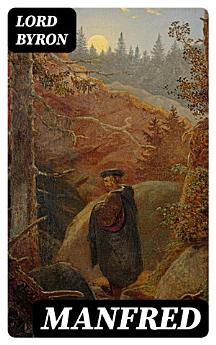Manfred
Lord Byron
nóv. 2022 · DigiCat
Rafbók
349
Síður
family_home
Gjaldgeng
info
reportEinkunnir og umsagnir eru ekki staðfestar Nánar
Um þessa rafbók
In "Manfred," Lord Byron intricately weaves a tale of a tormented nobleman grappling with overwhelming guilt and existential despair. This dramatic poem employs a blend of Gothic elements and Romantic sensibilities, encapsulated in Manfred's soliloquies that explore themes of self-identity, isolation, and the quest for redemption. Byron's lush and evocative language elevates the narrative, emphasizing the interplay between nature and the human soul, while the structure—reflective of both verse drama and lyrical poetry—offers a unique reading experience steeped in emotion and philosophical inquiry. Lord Byron, renowned as one of the leading figures of the Romantic movement, infused his personal experiences and turbulent life into his works. Often seen as a flawed genius himself, his encounters with love, loss, and the pursuit of freedom deeply informed his writing. "Manfred" was penned during a period of personal upheaval for Byron, drawing on his own struggles with societal expectations, isolation, and the dark undercurrents of human ambition. This backdrop enriches the poem, making it a poignant reflection of his internal conflicts. For readers seeking a profound exploration of the human psyche and a rich tapestry of Romantic ideals, "Manfred" is an essential addition to the literary canon. Byron's masterful command of verse and his deep psychological insights create a compelling narrative that resonates with themes of anguish and transcendence. This work invites readers into a world where the struggles of the heart and mind remain timeless.
Um höfundinn
George Gordon Byron, more commonly known as Lord Byron (1788–1824), was a prominent figure of the Romantic movement, distinguished by his flamboyant and controversial lifestyle as much as by his literary achievements. Born in London, Byron inherited his title at the age of ten, which elevated him into the ranks of the British aristocracy. Best known for his lyrical and long-form poetry, Byron's works encompass a vast range of themes, from love to social critique. 'Manfred', a Faustian dramatic poem published in 1817, stands as a notable example of his dramatic and introspective style, reflecting his own tortured soul through the titular character—a tortured noble tormented by guilt and seeking solace in the supernatural. Byron's adept use of Byronic heroes—brooding, tortured individuals with a disdain for societal norms and a marked predilection for melancholy—permeated not just 'Manfred' but also other works such as 'Childe Harold's Pilgrimage' and 'Don Juan'. His mastery of the Spenserian stanza and the ottava rima is particularly noteworthy, showcasing the lyrical prowess that has come to define his contributions to English literature. Byron's legacy extends beyond his written work; his life and personality have left a lasting imprint on the cultural psyche, and his notoriety as both a social pariah and a literary genius continues to be the subject of scholarly fascination and debate.
Gefa þessari rafbók einkunn.
Segðu okkur hvað þér finnst.
Upplýsingar um lestur
Snjallsímar og spjaldtölvur
Settu upp forritið Google Play Books fyrir Android og iPad/iPhone. Það samstillist sjálfkrafa við reikninginn þinn og gerir þér kleift að lesa með eða án nettengingar hvar sem þú ert.
Fartölvur og tölvur
Hægt er að hlusta á hljóðbækur sem keyptar eru í Google Play í vafranum í tölvunni.
Lesbretti og önnur tæki
Til að lesa af lesbrettum eins og Kobo-lesbrettum þarftu að hlaða niður skrá og flytja hana yfir í tækið þitt. Fylgdu nákvæmum leiðbeiningum hjálparmiðstöðvar til að flytja skrár yfir í studd lesbretti.








